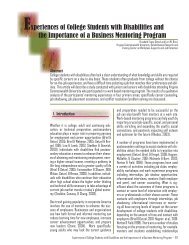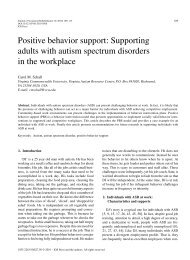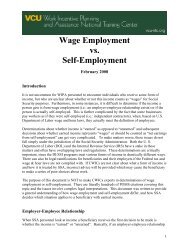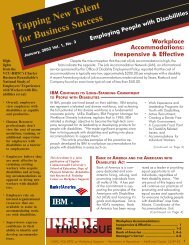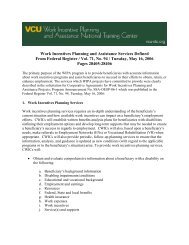10 Things You Can Do To Support A Person - Worksupport.com
10 Things You Can Do To Support A Person - Worksupport.com
10 Things You Can Do To Support A Person - Worksupport.com
- No tags were found...
You also want an ePaper? Increase the reach of your titles
YUMPU automatically turns print PDFs into web optimized ePapers that Google loves.
People with significant disabilitiesoften live in ghettos of reward.Indeed, it is often this poverty ofreward, not a lack of skills, thatkeeps people separate from other<strong>com</strong>munity members. Manymust endure reward schedulesfor good behavior. The very fewthings that they enjoy are usedcontingently to reinforce<strong>com</strong>pliance (talk about spoiling agood thing!).Count the number of things theperson enjoys, the number ofplaces she likes to go. Comparethis to the number of thingsother people enjoy, the numberof places other people go. Askyourself, "Is the person havingfun? Is she experiencing enoughjoy? Is this an interesting lifewith things to look forward to?"Help the person to add to her listof interesting (and really fun)things to do. Spend time inregular <strong>com</strong>munity places wherepeople hang out. If you feel<strong>com</strong>pelled to take data onsomething, take data on theamount of fun you find. Makefun a goal.<strong>10</strong>. Establish a goodworkingrelationship with theperson's primaryhealth carephysician.Mark Durand has said, "Peopletend to get immature when theydon't feel well." How often haveyou experienced a general declinein your mood or your ability toempathize with the needs ofothers when you don't feel well?When we are sick, we are notourselves.Many people who exhibitdifficult behaviors do so becausethey don't feel well. The suddenappearance of behavior problemsmay be a signal that the persondoes not feel well. Illnesses as<strong>com</strong>mon as a cold or ear achecan result in beh aviors asinconsequential as grumpiness oras serious as head banging.It is important to establish aworking relationship with a goodprimary health care physician.Although this is easier said thandone, the person will, especially ifhe has difficulty <strong>com</strong>municating,need a doctor who can help himto stay healthy and well.Remember that physicians, likemany other people who grew upin our "separate" society do notalways understand (and may evenfear) a person with substantialdisabilities.<strong>Do</strong>n't be afraid of telling theperson's doctor that you don'tunderstand a re<strong>com</strong>mendation orfinding. It is important to get aclear and straightforward answerto all of your questions.Remember too that it isimportant to go beyond aconcept of health as the absenceof a disease or illness. "Feelingwell" and "being healthy"involves everything from abalanced diet to a good night'ssleep. Help the person to achievea state of "wellness."www.dimagine.<strong>com</strong><strong>10</strong> <strong>Things</strong> <strong>You</strong> <strong>Can</strong> <strong>Do</strong> <strong>To</strong><strong>Support</strong> A <strong>Person</strong> WithDifficult Behaviors appearedin the Summer/Fall 1997 issueof The Community Journal.Back issues of the Journal canbe downloaded from theCommonwealth Coalition forCommunity’s web site:www.<strong>com</strong>mcoal.org<strong>You</strong> can also subscribe to theJournal FREE of charge bysending your name, fulladdress, zip code, Emailaddress (optional) and phonenumber (optional) to:The Community JournalPO Box <strong>10</strong>704Blacksburg, VA 24060-0704Or subscribe online at:www.<strong>com</strong>mcoal.orgI can be reached at Imagine,3694 Mt. Tabor Road,Blacksburg, VA. 24060 (w: 540-552-5629) or Dimagine@aol.<strong>com</strong>.<strong>You</strong> can also visit my web site:www.dimagine.<strong>com</strong>Version 20 January 2002David Pitonyak—6



